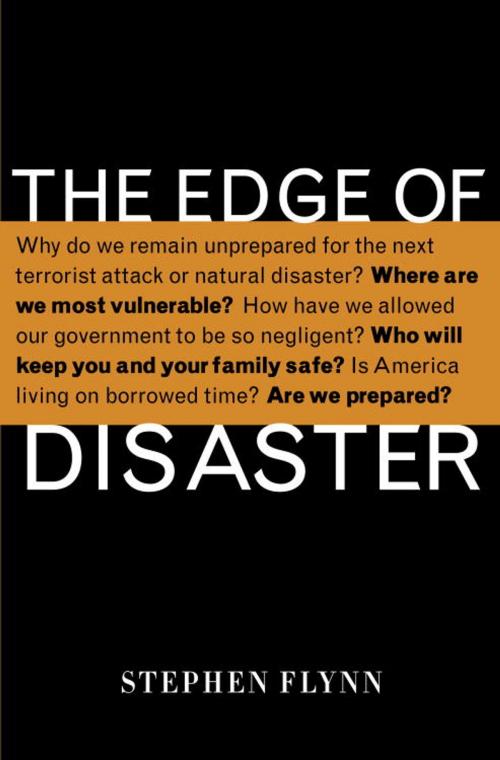The Edge of Disaster
Rebulding a Resilient Nation
Nonfiction, Social & Cultural Studies, Political Science, International, International Security| Author: | Stephen Flynn | ISBN: | 9781588365675 |
| Publisher: | Random House Publishing Group | Publication: | February 20, 2007 |
| Imprint: | Random House | Language: | English |
| Author: | Stephen Flynn |
| ISBN: | 9781588365675 |
| Publisher: | Random House Publishing Group |
| Publication: | February 20, 2007 |
| Imprint: | Random House |
| Language: | English |
Why do we remain unprepared for the next terrorist attack or natural disaster? Where are we most vulnerable? How have we allowed our government to be so negligent? Who will keep you and your family safe? Is America living on borrowed time? How can we become a more resilient nation?
Americans are in denial when it comes to facing up to how vulnerable our nation is to disaster, be it terrorist attack or act of God. We have learned little from the cataclysms of September 11 and Hurricane Katrina. When it comes to catastrophe, America is living on borrowed time–and squandering it. In this new book, leading security expert Stephen Flynn issues a call to action, demanding that we wake up and prepare immediately for a safer future.
The truth is acts of terror cannot always be prevented, and nature continues to show its fury in frighteningly unpredictable ways. Resiliency, argues Flynn, must now become our national motto. With chilling frankness and clarity, Flynn paints an all too real scenario of the threats we face within our own borders. A terrorist attack on a tanker carrying liquefied natural gas into Boston Harbor could kill thousands and leave millions more of New Englanders without power or heat. The destruction of a ship with a cargo of oil in Long Beach, California, could bring the West Coast economy to its knees and endanger the surrounding population. But even these all-too-plausible terrorist scenarios pale in comparison to the potential destruction wrought by a major earthquake or hurricane.
Our growing exposure to man-made and natural perils is largely rooted in our own negligence, as we take for granted the infrastructure handed down to us by earlier generations. Once the envy of the world, this infrastructure is now crumbling. After decades of neglect, our public health system leaves us at the mercy of microbes that could kill millions in the next flu pandemic. Flash flooding could wipe out a fifty-year-old dam north of Phoenix, placing thousands of homes and lives at risk. The next San Francisco earthquake could destroy century-old levees, contaminating the freshwater supply that most of California relies on for survival.
It doesn’t have to be this way. The Edge of Disaster tells us what we can do about it, as individuals and as a society. We can–and, Flynn argues, we must–construct a more resilient nation. With the wounds of recent national tragedies still unhealed, the time to act is now.
Flynn argues that by tackling head-on, eyes open the perils that lie before us, we can remain true to our most important and endearing national trait: our sense of optimism about the future and our conviction that we can change it for the better for ourselves–and our children.
Why do we remain unprepared for the next terrorist attack or natural disaster? Where are we most vulnerable? How have we allowed our government to be so negligent? Who will keep you and your family safe? Is America living on borrowed time? How can we become a more resilient nation?
Americans are in denial when it comes to facing up to how vulnerable our nation is to disaster, be it terrorist attack or act of God. We have learned little from the cataclysms of September 11 and Hurricane Katrina. When it comes to catastrophe, America is living on borrowed time–and squandering it. In this new book, leading security expert Stephen Flynn issues a call to action, demanding that we wake up and prepare immediately for a safer future.
The truth is acts of terror cannot always be prevented, and nature continues to show its fury in frighteningly unpredictable ways. Resiliency, argues Flynn, must now become our national motto. With chilling frankness and clarity, Flynn paints an all too real scenario of the threats we face within our own borders. A terrorist attack on a tanker carrying liquefied natural gas into Boston Harbor could kill thousands and leave millions more of New Englanders without power or heat. The destruction of a ship with a cargo of oil in Long Beach, California, could bring the West Coast economy to its knees and endanger the surrounding population. But even these all-too-plausible terrorist scenarios pale in comparison to the potential destruction wrought by a major earthquake or hurricane.
Our growing exposure to man-made and natural perils is largely rooted in our own negligence, as we take for granted the infrastructure handed down to us by earlier generations. Once the envy of the world, this infrastructure is now crumbling. After decades of neglect, our public health system leaves us at the mercy of microbes that could kill millions in the next flu pandemic. Flash flooding could wipe out a fifty-year-old dam north of Phoenix, placing thousands of homes and lives at risk. The next San Francisco earthquake could destroy century-old levees, contaminating the freshwater supply that most of California relies on for survival.
It doesn’t have to be this way. The Edge of Disaster tells us what we can do about it, as individuals and as a society. We can–and, Flynn argues, we must–construct a more resilient nation. With the wounds of recent national tragedies still unhealed, the time to act is now.
Flynn argues that by tackling head-on, eyes open the perils that lie before us, we can remain true to our most important and endearing national trait: our sense of optimism about the future and our conviction that we can change it for the better for ourselves–and our children.















